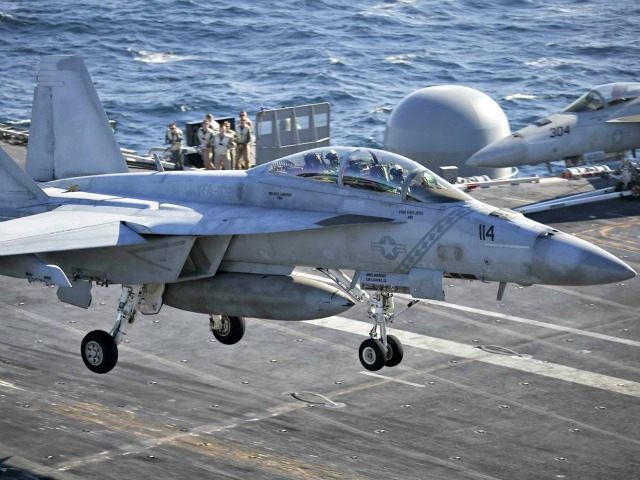WASHINGTON, D.C. — U.S. fighter jets intercepted Russian warplanes flying as low as 500 feet near the USS Ronald Reagan, a massive nuclear-powered aircraft supercarrier, as it sailed in international waters east of the Korean Peninsula earlier this week, the White House has confirmed.
The encounter took place while the U.S. and its close ally South Korea were conducting a military exercise “in international waters in the Sea of Japan, off the Korean Peninsula,” White House press secretary Josh Earnest told reporters on Thursday.
Military newspaper Stars and Stripes, which first reported the encounter, revealed that two Russian Tu-142 Bear naval reconnaissance aircraft “flew within one nautical mile” of the USS Ronald Reagan “at a heigh of 500 feet,” prompting the 100,000-ton warship to launch four F/A-18 fighter jets “in response.”
An American ship followed the Russian aircraft as they flew away from the U.S. supercarrier, noted Stars and Stripes.
“The Navy said a ship escorting the Reagan during exercises near the Korean Peninsula hailed the Russian planes but did not get a response,” notes CNN.
Although Earnest said the U.S. has “significant concerns” with Russia’s military activities in Ukraine and Syria, he downplayed the recent incident as “not a particularly threatening encounter.”
“It was in international waters,” he said, “and once the U.S. military aircraft had been launched, the Russian military aircraft were escorted away.”
In a statement to CNN, the U.S. Navy dismissed the incident as “standard operating procedure.”
“It is standard operating procedure for U.S. planes to escort aircraft flying in the vicinity of U.S. Navy ships,” Navy Cmdr. William J. Marks told CNN in an email. “This type of interaction is not unprecedented. Overall I would characterize the interaction as safe.”
The two Russian Tu-142s were first intercepted by Korean military aircraft that were operating in the region, noted Earnest. Then, four F/A-18 fighters from the USS Ronald Reagan were deployed to intercept the Russian aircraft.
The Russian Tu-142 is a naval reconnaissance and anti-submarine warfare aircraft offshoot of the Russian Tu-95 Bear bomber family that reportedly appeared during the Cold War.
“The U.S. Navy aircraft did escort the Russian aircraft until they departed the area where the carrier, the USS Ronald Reagan, was operating,” explained Earnest. “We have previously raised concerns about Russian military aircraft essentially carrying out incursions on the sovereignty of other countries.”
He went on the say that the U.S. has “regularly urged” Russia to ensure that its military operations are consistent with international protocols.
“This is a particular situation that did not result in a significant confrontation for that reason,” declared Earnest, adding that “anywhere around the world where we need to take steps to ensure the safety and security of our men and women in uniform, we’re going to take those steps.”
While conceding that there are “some vigorous disagreements” between the U.S. and Russia, the White House press secretary declined to characterize the current strained U.S.-Russia relationship as a new Cold War, noting that “Russia is no longer a superpower — observed in the last couple of weeks that the condition of Russia’s economy is weak and further deteriorating.”
“The situation today is much different… [as] Russia does not have the same kind of influence around the globe that the Soviet Union once did,” Earnest told reporters. “Russia does not have the kind of economic power that the Soviet Union once was able to flex.”
Tuesday’s encounter between the U.S. and Russian militaries is nothing new.
U.S. warplanes intercepted Russian fighters off the coast of Alaska and California on July 4.
Last summer, Nick de Larrinaga, Europe editor for IHS Jane’s Defense Weekly, told CNN that “encounters such as these were common during the Cold War. They subsided with its end but picked up again under current Russian President Vladimir Putin.”

COMMENTS
Please let us know if you're having issues with commenting.